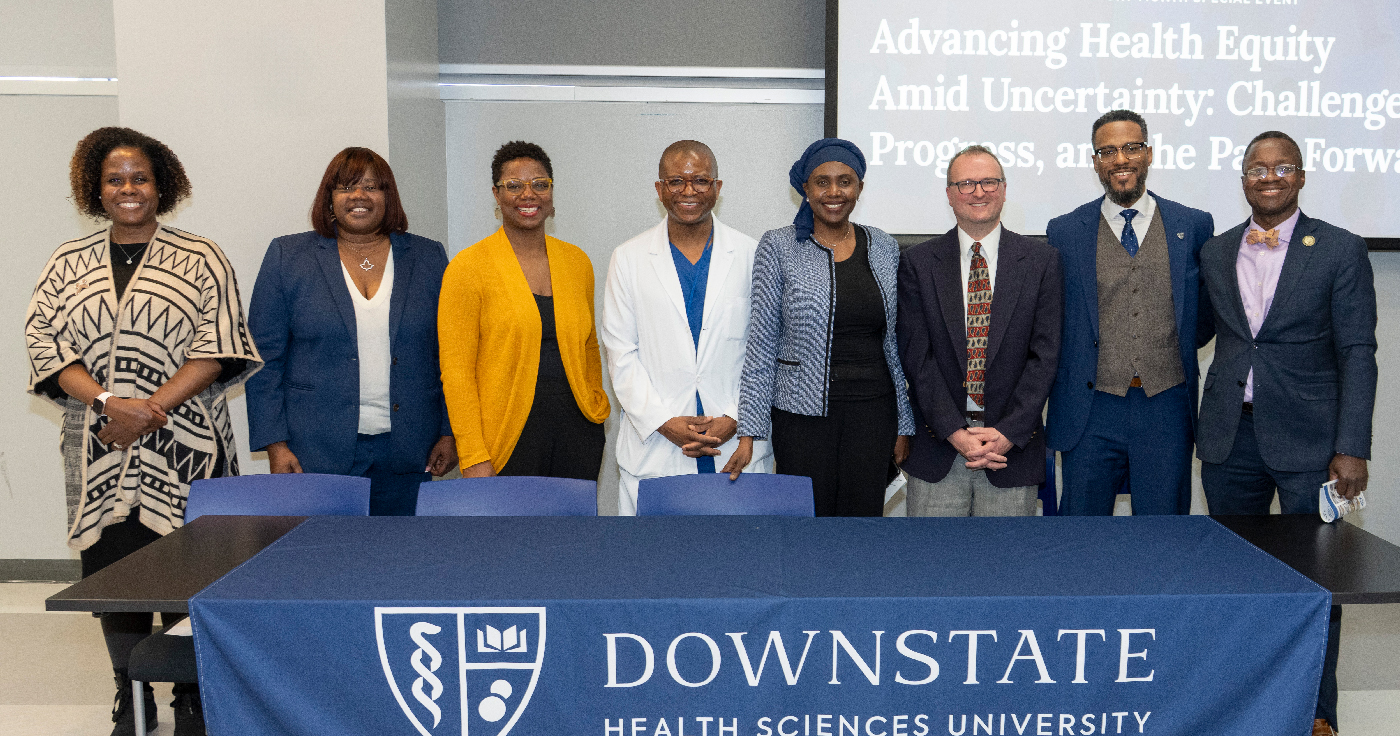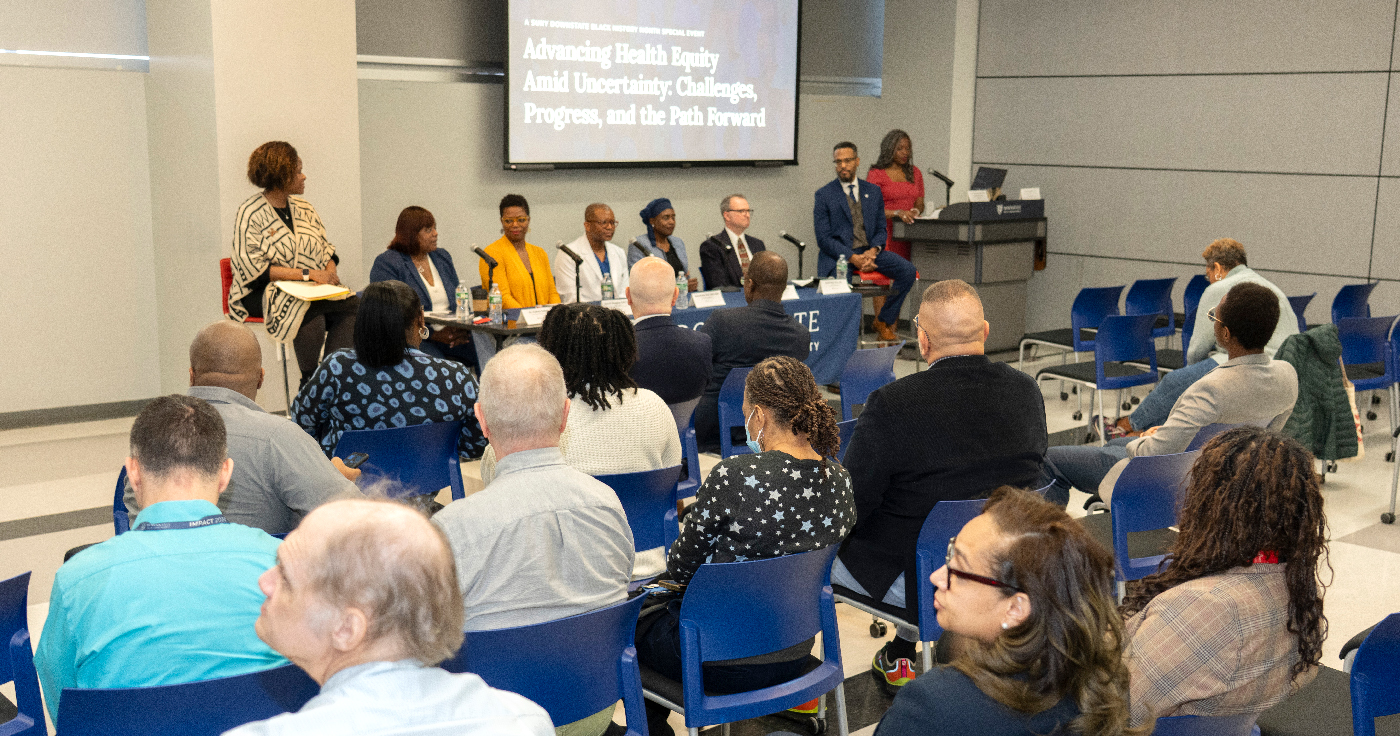Justice in Healthcare: Experts Call for Action on Disparities and Accountability
By Office of the President | Mar 11, 2025

Downstate hosted a Black History Month discussion on health equity, gathering experts to examine systemic barriers, historical injustices, and strategies for change. Advancing Health Equity Amid Uncertainty explored the root causes of disparities and steps to build a more just healthcare system.
Opening the discussion, Moro Salifu, M.D., MBA, MPH, MACP, Chair of Medicine, called for ongoing dialogue, collaboration, and concrete action to ensure high-quality healthcare for all. Moderators W. Marcus Lambert, Ph.D., Associate Vice President for Research, and Teresa Y. Smith, M.D., MSEd, Associate Dean of Graduate Medical Education & Affiliations and Interim Chair of the Emergency Department, led an insightful conversation with panelists committed to improving healthcare outcomes.

Dan Ehlke, Ph.D., Associate Professor of Health Policy and Management, examined social determinants of health, structural inequities, and political forces shaping reform. Marilyn Fraser, M.D., CEO of the Arthur Ashe Institute for Urban Health, emphasized community engagement and research as essential to health interventions. Brian K. McNeil, M.D., MBA, Vice Chair of Urology, described efforts to improve clinical care in underserved communities. Azure B. Thompson, DrPH, MPH, Professor of Community Health Sciences, explored links between substance abuse, mental health, and systemic inequities. Rev. Kimberly Council, Deputy Brooklyn Borough President, discussed public health efforts addressing food insecurity and community well-being.
Panelists emphasized the disproportionate burden of chronic diseases—including heart disease, stroke, diabetes, and cancer—on Black communities, linking these health crises to structural barriers such as limited healthcare access, unstable housing, food insecurity, and educational inequities. Without addressing these root causes, health equity will remain unattainable.
The shifting policy landscape presents additional threats. Cuts to Medicaid and rollbacks of diversity, equity, and inclusion (DEI) programs further undermine efforts to expand healthcare access. At the same time, bias in clinical decision-making perpetuates disparities. Panelists pointed to race-based adjustments in kidney function tests and heart disease risk assessments as flawed practices that reinforce inequities. At the same time, inaccurate algorithms in electronic health records skew psychiatric treatment.
To combat these challenges, panelists called for policy advocacy, community engagement, and a critical reassessment of racial classifications in medical research and practice. Expanding pipeline programs to diversify the medical workforce and implementing cultural competency training for providers are essential steps toward eliminating bias and ensuring equitable care.

Medical education must represent the communities it serves. Downstate’s pipeline programs expose students to medical careers, while cultural competency training improves provider-patient relationships. However, bias in clinical decision-making remains a challenge. Panelists pointed to race-based adjustments in kidney function tests and heart disease risk assessments as flawed practices that reinforce disparities. Bias also extends to psychiatric treatment, where inaccurate algorithms in electronic health records skew care. To address these issues, they called for critically reevaluating racial classifications in medical research and practice.
Effective messaging plays a key role in advancing health equity. Historically, Medicare gained bipartisan support when framed as a universal benefit rather than a welfare program. Similarly, panelists suggested reframing foreclosure rates as a distressed homeowner crisis rather than a racial disparity to attract broader advocacy support.
The Black maternal health crisis illustrates the urgent need for physician accountability. Panelists recommended value-based payment models and community-led oversight to ensure equitable maternal care and improve health outcomes.
As the discussion concluded, panelists outlined clear, actionable steps:
- Expand research on health disparities
- Strengthen community outreach programs
- Implement tailored health interventions
- Advocate for Medicaid protection and expansion
- Increase diversity in the medical workforce
- Eliminate racial bias in research and treatment
- Develop culturally competent training for providers
- Establish community-driven physician accountability benchmarks
Advancing health equity is urgent. Systemic barriers persist. However, strategic action, policy advocacy, and community partnerships can drive real progress. The conversation must move forward and implement solutions to ensure equitable healthcare.
I am proud of Downstate’s work in the fight for healthcare equity. Thank you to the panelists, moderators, and everyone who participated in this critical conversation. The Offices of the President and Communications & Marketing were proud to host this conversation.
BHM 2025 Advancing Health Equity
Tags: Health Disparities